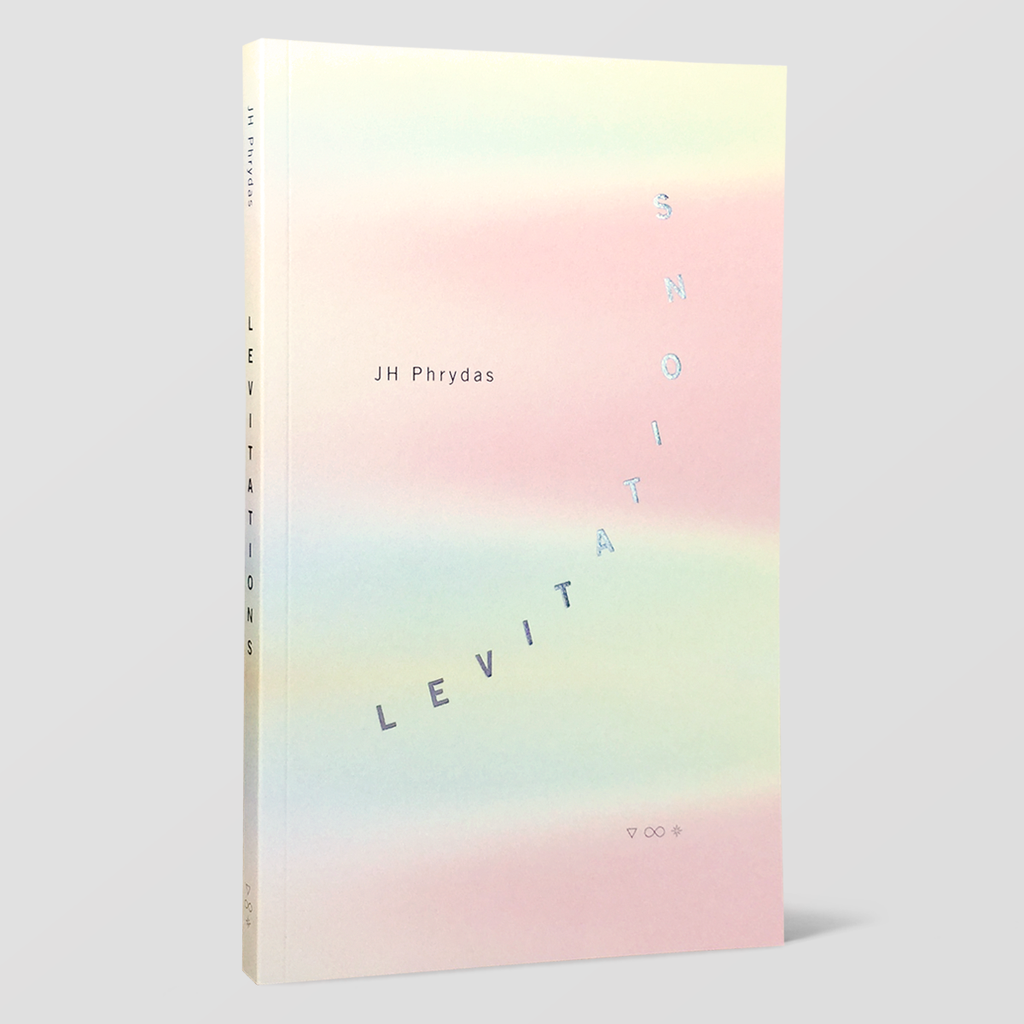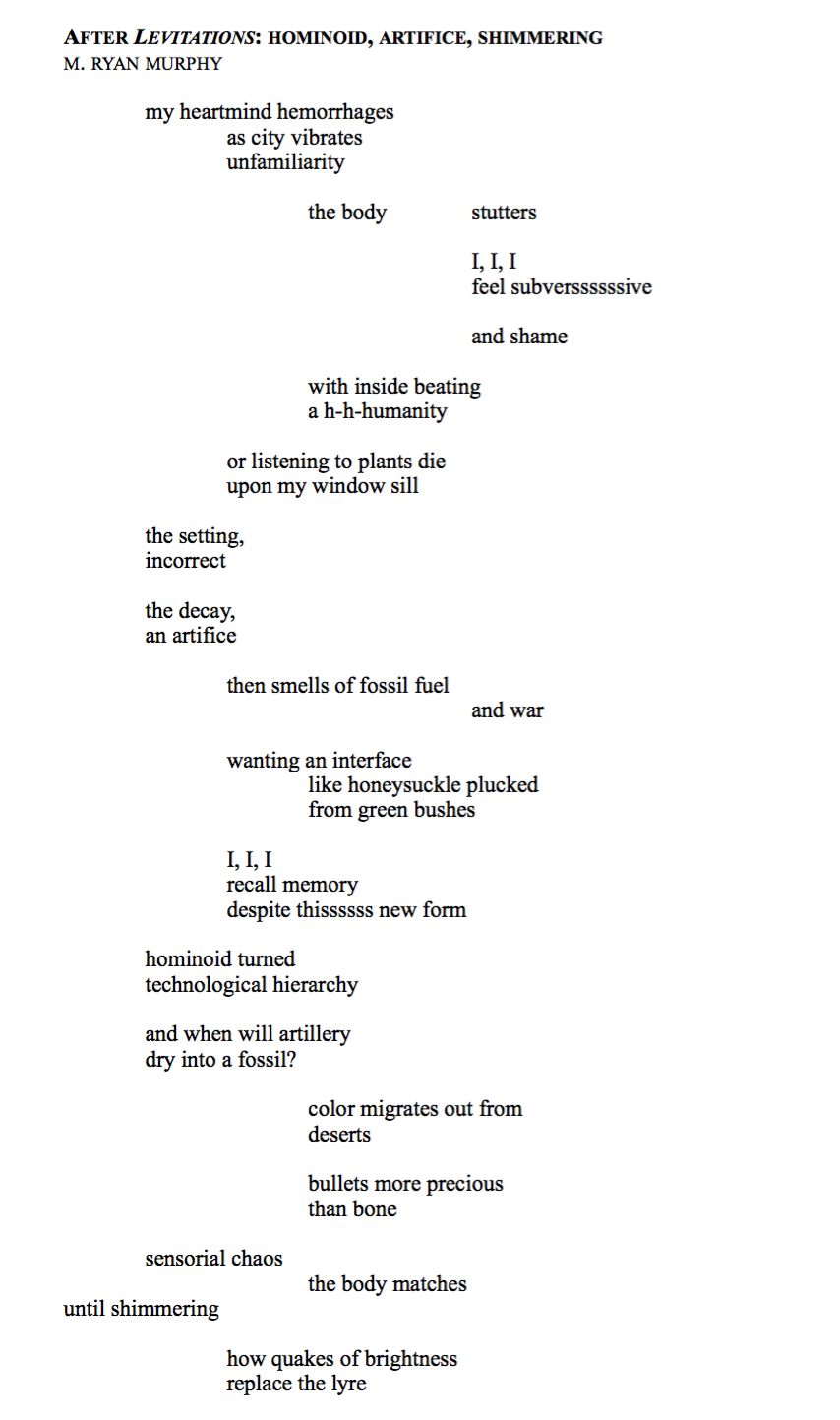We Queers, Powered: Levitations by JH Phrydas

First published in Entropy Magazine by M. Ryan Murphy
When architectures shift, walls dissolve, learned histories unwind, and spaces vibrate into a queer enormity, language adapts, entering stages of levitation. As stated in his introduction, JH Phrydas’ poetry marks an initial break into further beginnings. Each line molds words into fuel for revolt. In Levitations, the body unlearns a corrupt lineage, restructuring the architecture of current and historical space and community to embrace self-love and militant queer continuation.
The room is and is not. The mother is and is not. The body is and is not. Throughout, Phrydas questions symbolism and materiality in a way that opens all to equal occupation and voice. Phrydas breaks and re-breaks, examines and re-examines all until the old opens into new.
“Entering my mother, I invented an architecture.”
From the start, we enter back into childhood in order to dismantle any inherited illusion of set structure. Phrydas leads a descent beyond, underneath, and between the unit of family and mother. In this way, an initial break is unlearning. To completely uncover the “…architectural blueprints of a written animal, snarling.” Whether this animal is the false transference of a system of metaphors passed down through family or a new queer technology for use in struggles ahead, we still enter into the next space. Always the next room “to enter” infinitesimally. Always the next bit of mother to un-understand. Always new knowledge around a space continually not our own, accompanied by years of shame. But that’s the nature of entrance – a risk of hostility in an unknown.
And even breath is often not our own. The endless need to connect and touch is a toxic clinging when the ideal lover (self or other) is not clear. “To wrap the excess skin around your torso and breathe for her.” The self is chained until understanding the initial room is too small. The architecture of birth does not fit and must be dismantled to make room for more, for color out of darkness.
Thus, connection through the mouth: from mother’s lung into our own spit, our own composition, our own room within the biology of the body. “The figure scoops the ashen remnants, / spits, / and gets to work:” The colon signaling expansion.
We then enter the city, the body, the community as a unit constructed of closed language. This room is that of a hateful past, and the structure seeks the destruction of others. But the body and voice will shift into a colorful community that joins in the fight (be it peaceful or not) for creating a new kind of architecture beyond “the city [that] meshes harsh words with contours / of bodies and eyes that, voiceless, construct streets with no / exit.” How the goal then becomes communion of diverse bodies equal in facing various oppressions. How the goal also becomes entrance into the celebration of queer community, exit from the current space of blue and red and ash, and finally, embrace of what’s truly not artifice – the self and the language persistent.
We continue, reclaiming identity and the self from bodies that confuse and combat us. Bodies that construct artifice. “I looked for an advocate,” and finding him becomes the clear last step into “a language / pre-soot yet grimed in / its inevitable always.”
“An event: an embrace.”
Like in Erin Mouré’s Furious, we embrace the language beyond – that emotional sub-layered pre-language that is pure meaning – before further utterance. We embrace the messy inside space that is still “pre-soot” before continuing the fight for more queer-ed structures. This inside space is messy with inclusion but good.
Phrydas’ embrace is multitudinous, with rise and fall, fragment and prose, decay and fruition, and daily living.
“…we practice / backing up.”
We question
“…where is this fucked-up space we seek.”
We
“hack / a hole through which to pull him, up…”
“We fall over. / We overthink. / We shit and eat.”
And yet, “becoming smaller [is] not an option.” The space perpetually shifts; this time while finding another to join us. “He, then.” And a crucial event accompanies this discovery. “Something: sensations.” The touch of voices with similar ideas of continuation. The recognition of self within a powerful lineage. The ultimate levitation – “…rising up / out of darkness / he holding mine / into this – ”
Not in but into. “To enter,” despite the knowledge of “the historic crush” and a future of being “…covered / and / recovered…” How these marks of ash become a symbol of shame turned pride. We queers, perverse and covered in the historical filth but powered in transforming the future. We are the frontline of shifting old symbols into new, perhaps first in language, in poetry and then out in the world.
Rachel Levitsky says, “the test of a movement is how it treats its perverts.” For Phyrdas, Levitations is the first embrace of many – all surrounding the creation of queer space and community, a destruction of the illusion of set architecture and beliefs, and a personal love poem to the self and other poets that continue to expand our sphere of living and throw us into language that “keeps em from scattering.” Into language beyond confines. As symbols and space shift for the better, Phrydas ceaselessly holds us along the way. For there is always more work ahead, more care to foster.
“I holding his body / wrenched and held aloft / on hot breath.”
Voices rising into color, always.
“Entering my mother, I invented an architecture.”
“An event: an embrace.”
“…we practice / backing up.”
“We fall over. / We overthink. / We shit and eat.”
“I holding his body / wrenched and held aloft / on hot breath.”
